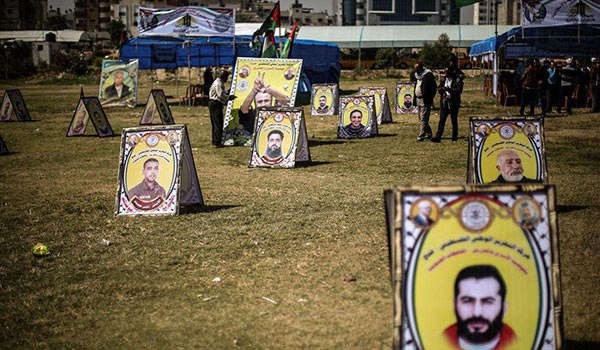
RNA - The media committee established to support what has come to be known as the “Freedom and Dignity" strike, announced that six Palestinian prisoners held in Megiddo prison in Northern Israel began refusing meals on Thursday and were immediately placed in isolation, Ma'an reported.
34 additional Palestinian prisoners in Megiddo joined the some 1,500 Palestinians who launched the hunger strike one week ago, in protest of the torture, ill treatment, and medical neglect of prisoners at the hands of Israeli authorities, as well as Israel’s widespread use of administrative detention, internment without trial or charges, which is only permitted under international law in extremely limited circumstances.
The Israel Prison Service (IPS) prevented lawyers from the Palestinian Committee of Prisoners’ Affairs from visiting the hunger strikers in Megiddo, despite a decision made Wednesday by the Israeli Ministry of Justice saying that it was illegal to ban prisoners from accessing their lawyers.
The Palestinian Prisoners’ Society has filed a complaint on behalf of lawyers who have been prevented from visiting hunger strikers.
As of Thursday, lawyers representing hunger strikers in Ashkelon, Gilboa, Eshel, and Nafha prison were either still being banned from visiting their clients, denied permits, or were told that visits were postponed. Only three hunger-striking prisoners in Ofer prison have been allowed to receive legal visits since the beginning of the strike, according prisoners’ solidarity network Samidoun.
The media committee of the Freedom and Dignity strike later confirmed that only three prisoners in Ofer had been able to see their lawyers.
Imprisoned Palestinians have also reported that IPS officials have continued to deny them family visits.
Meanwhile, IPS transferred two hunger strikers, Abd al-Rahman Khalil Muhammad Mahmoud and Bilal Ajarma, from Gilboa prison to solitary confinement cells Ashkelon prison, local sources said Sunday.
Mahmoud, 36, is from the al-Issawiya neighborhood in occupied East Jerusalem and has served 15 years of a 17-year prison sentence. Ajarma, from the town of Silwad in the central occupied West Bank, was sentenced to two life terms and an additional 20-year sentence, and is considered a leader in the Palestinian prisoners’ movement.
847/940